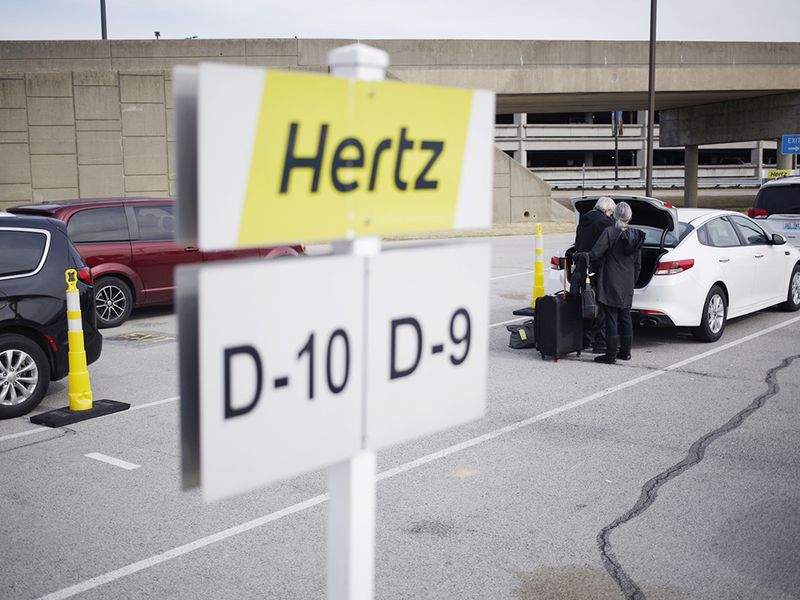
Hertz Global Holdings Inc.’s creditors were offered two bad choices when hammering out a deal to keep it out of bankruptcy: cut the 102-year-old company some slack and hope it recovers, or let it slip into insolvency and try to recoup their investment in sales of its devalued rental fleet.
The holders of Hertz’s asset-backed securities (ABS) blinked and gave the company until May 22 to pay them about $400 million. Hertz knew its creditors would want to avoid bankruptcy, which could trigger a fire sale of devalued used cars if the ABS trusts that hold the vehicles have to liquidate, people familiar with the matter told Bloomberg.
That sets up a parallel quandary for Hertz’s bank lenders, which kept fighting after the ABS holders had agreed to a forbearance. In the next two weeks, Hertz’s banks — led by Deutsche Bank and Barclays — must decide whether to allow Hertz to raise more money to pay the ABS holders, or let it slide into bankruptcy, said the people, who asked not to identified because the discussions are private.
The possibility of a future bankruptcy filing is still on the table, the people said.
Rental-car companies in bankruptcy typically look to unwind their ABS by selling down the fleet that backs the bonds. The coronavirus pandemic that has squeezed Hertz’s finances, though, has also sent resale values for those vehicles plunging.
That leaves Hertz’s creditors, lenders and investors, including controlling shareholder Carl Icahn, in a three-way standoff.
Hertz has traditionally been a leading buyer of fleet cars from the Detroit 3 and other automakers. Last year, Hertz held as many as 567,600 vehicles in its U.S. fleet and 204,000 in its international unit, holding those in the U.S. for an average of 18 months and international vehicles for 12 months, according to a U.S. filing.
Its biggest suppliers of fleet vehicles were General Motors (21 percent), Fiat Chrysler (18 percent), Ford (12 percent), Kia (10 percent), Toyota (9 percent), Nissan (7 percent) and Hyundai (5 percent), according to the filing.
Three-way standoff
The holders of Hertz’s asset-backed paper have agreed to delay pressing for a sale of vehicles, but they will need the banks to agree to make them whole, or close to it. The banks, facing the unlikely prospect of recovering close to $3 billion in debt in a bankruptcy, could extend such a promise but risk greater losses if the rental business and used-car prices don’t recover fast enough.
Icahn may need to put in more money, or perhaps watch his 39 percent equity stake go up in smoke in a bankruptcy in which equity holders’ claims would be behind those of creditors.
“Hertz is probably trying to do what Avis already did, which is to get the banks to let the company issue more debt,” said Hamzah Mazari, an analyst with Jefferies Group LLC., in an interview. “If the banks say no, Hertz will have to file for bankruptcy.”
Everyone has a lot at stake. Hertz has $13.4 billion in ABS debt that its holders would have to recoup by selling used cars.
S&P Global Ratings cut Hertz’s corporate credit rating to “selective default” on Thursday, saying it doesn’t believe the company’s liquidity position will improve before its forbearance period ends, forcing it to pursue a restructuring or file for bankruptcy.
If the banks can’t get access to cars in bankruptcy, that leaves about $800 million in non-vehicle assets that they could target to recoup almost $3 billion in bad loans, Mazari said.
Icahn’s stake
On the equity side, Icahn’s stake is worth $169 million with Hertz trading at $3.05 a share on Thursday. But having paid an average share price of $29, he has about $1.6 billion sunk in Hertz.
Bankruptcy is tricky enough. Add to that a 70 percent drop in used car sales in April tied to the pandemic and its restrictions. The used-car auctions in which dealers and rental companies sell their vehicles have shut down save for online sales, leaving inventory stranded on lots and prices plummeting.
Manheim, the nation’s largest used vehicle auction, said wholesale prices in April dropped 11.4 percent from March, a record month-over-month decline.
Even a few weeks could help the market for used cars perk up as states loosen pandemic shelter-in-place orders and consumers begin to contemplate travel again. And used-car values may not plunge as much this year as some had feared, Morgan Stanley said in a report Tuesday.
General Motors CFO Dhivya Suryadevara said during the automaker’s earnings call Wednesday that its finance company expects the residual value of its vehicles to drop as much as 10 percent this year.
Automaker incentives
Still, it would take time to recoup full value. Even when consumers feel comfortable shopping, discounts on new cars will keep pressure on used car prices. Automakers offered 0% financing on a record share of the new cars they sold last month.
If Hertz can avoid a bankruptcy filing and sell off some used cars to generate cash, the company may be able to stay afloat, Mazari said. Then Icahn, who didn’t return a call seeking comment, could put more money in to protect is investment.
“I’m surprised Icahn hasn’t put money in already,” Mazari said. “But he is probably waiting to see what the creditors do first.”
Automotive News contributed to this report.